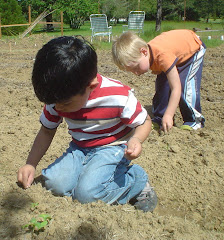(To read a compilation of all our potato blogs, go to:
Can I plant potatoes from the grocery store? and
Can I plant potatoes from the grocery store? and
So, your potatoes should be "chitted" by now if you followed the directions from our previous post. They've stored up lots of sunlight in the starchy flesh of the potato, the eyes have sprouted and have hardened-off so they won't break too easily when you plant them and, if you cut any of them to get more starts from a large potato, they have skinned over so they won't rot in the ground. They should look like this:

Chris and I have been saving up a whole mess of potatoes to plant at the community garden but we've been waiting for the soil to dry out a bit before we plow it and prep it for planting. We found a great way to store the potatoes in suspended animation till it's time to plant them. We placed a layer of maple leaves, about 3" thick in the bottom of a tub, placed a layer of potatoes in the tub and then another layer of leaves up to the top of the bin. We keep it in our carport so it's shaded and doesn't get any rain. Here's what it looks like:

Potatoes grow best at about 8" in the ground and with loose soil and mulch for them to grow up through. A post-hole digger is one way to dig your holes. A regular spade shovel works well too. Dig your holes about 10" -12" apart.

Put one seed potato in each hole. place the sprouts in such a way so that they won't get broken as you pull soil back over-top of them. We put a large double handful of worm castings, and a small handful of organic fertilizer in each hole. Last year we didn't have the worm castings so we used rabbit manure instead. This feeds your potatoes until their greens get up above the ground and the plant can feed directly from sunlight.

Pull the soil you dug out of the hole back into the hole, loosening and breaking it up as you go. You want to make it easy for the sprouts to grow up through them. Mulch heavily with straw or leaves. Keep an eye out for the sprouts as they emerge. If there's still a danger of frost (up to May 20 in our region), you want to be sure and add more mulch to cover all the greens so they don't get frost burn.
How many potatoes should you plant? Figure that each seed potato will yield about 5 pounds of potatoes. In our household we eat about that many potatoes per week so we put in a minimum of 50 plants per year. Planting enough potatoes is our version of "homeland security"! Each variety of potato has a different time to maturity. You can dig up new potatoes (with the skin still soft enough to rub off with your fingers) when the plants begin to flower. They'll be small and tender to eat but won't store well. If you wait till the greens die back, the skins will have hardened making them good for storage.
Since conventionally grown potatoes are still relatively cheap to buy, why grow your own? Potatoes provide one of the most cost-effective returns on your investment. For the amount of food they provide, they don't take up much space. Organic potatoes are not exactly cheap. Last time we looked they cost about $5 for three pounds. If you love potatoes like we do, that can really add up. Why eat them organic? Here's a quote from "Animal, Vegetable, Miracle" by Barbara Kingsolver (and her husband and daughter), a wonderful book about the joys of eating locally grown, organic food. On page 273, her daughter Camille says: "Because they grow underground, conventional potatoes are among the most pesticide-contaminated vegetables. Potatoes in the United States commonly contain chlorinated hydrocarbon insecticides and sometimes even residues of DDT, dieldrin, and chlordane, extremely hazardous chemicals that have been banned since 1978 but linger in the soil. Conventionally grown potatoes are so contaminated the Environmental Working Group warns parents not to feed them to infants and toddlers unless they're thoroughly peeled and boiled. This makes a strong case for buying organic potatoes from trustworthy growers who know the history of the land where their produce is raised." Or to grow your own!
(To read a compilation of all our potato blogs, go to:
Can I plant potatoes from the grocery store? and
Can I plant potatoes from the grocery store? and






































Found you via Pinterest. Glad I learn new knowledge about growing potatoes.
ReplyDelete